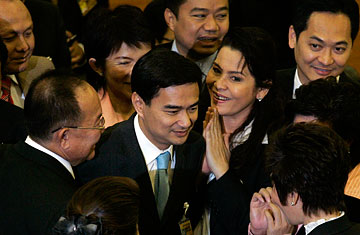
Abhisit Vejjajiva, center, greets members of Thailand's parliament after being voted in as the new prime minister in Bangkok on Dec. 15, 2008
Thailand's Democrat Party hasn't won a popular national election in more than a decade. But on Dec. 15, Abhisit Vejjajiva, the 44-year-old leader of the oldest Thai political party, was chosen in a slender majority by the country's parliament as the nation's fifth Prime Minister in a year. Beleaguered Thais hope that his leadership will put an end to a turbulent few years during which one PM was deposed in an army coup and a sustained anti-government protest movement ended in the removal of three others, as well as the takeover and closure of Bangkok's two airports for more than a week.
But as internationally respected as the incoming, Oxford-educated Prime Minister is, Abhisit helms a coalition that is shaky at best. In order to form a government, the Democrat Party aligned with one of its most vocal critics, Newin Chidchob. An erstwhile ally of ousted Prime Minister Thaksin Shinawatra, who now lives in exile after being convicted in absentia on abuse of power charges, Newin has made his reputation as a hard-nosed pork-barrel specialist. His brand of politics hardly hews to the more urban-centered intellectualism of the Democrats. Indeed, Thailand may be returning to the days of weak coalitions that dry up as quickly as rain puddles in the tropical sun. Even the anti-Thaksin Nation newspaper has questioned Abhisit's "ability to lead veteran politicians in a coalition government." (See pictures of the Thai protests.)
The uneasy alignment of Abhisit and Newin reflects a fundamental rift in Thai society between disaffected rural voters and a disgusted urban elite that cannot fathom the string of populist — and sometimes iron-fisted — leaders whom the masses have been choosing to represent them. Bangkok may gleam with malls and high-rises, but most of Thailand is still a poor country of rice farmers. The Democrats, with the exception of a support base in the Muslim-dominated south, have yet to convince rural voters that their party has the best interests of most Thais in mind. Abhisit has had a hard time gaining some farmers' support because he was born and educated in privilege in England; by virtue of his family background, he is simply not a man of the people. Although Thaksin is a wealthy telecoms tycoon and his cohorts have been linked with various abuses of power including vote-buying, his party's micro-financing and health-care initiatives resonated with the poor, who felt like these politicians were finally addressing their concerns.
Nevertheless, after a dispiriting few months in which Thais have seen their country's near-term economic prognosis go from ailing to moribund — in large part because of the anti-government protests that convulsed Bangkok and scared away tourists and foreign investors since August — the prospect of a Prime Minister who will not cause hundreds of thousands of yellow-shirted protesters to flood the streets must be a relief. True, Thaksin's supporters, who wore red clothes during their rallies to contrast with the opposition's yellow shirts, are hardly pleased. But in a sign that there may be a brief respite from divisive politics, Thaksin told his supporters in a pre-recorded message played to a rally of supporters on Saturday night that "all sides [should] take one step back and respect [the results of the P.M. parliamentary election]."
Thais can only hope that Abhisit's own vow to promote national unity will hold. Otherwise, in a time of global economic peril, Thailand will suffer just as badly as it did back when the Democrats were last in power. That was during the wake of the 1997 Asian financial crisis when the party's inability to discipline unwieldy coalition members led to political paralysis and financial mayhem. Instead of taking decisive action to gird the economy, politicians seemed to spend more of their time squabbling with each other and cooking up corrupt deals that alienated the public. Now that Thailand will be governed by yet another unlikely coalition, no one wants a repeat of that painful period in Thai history.
